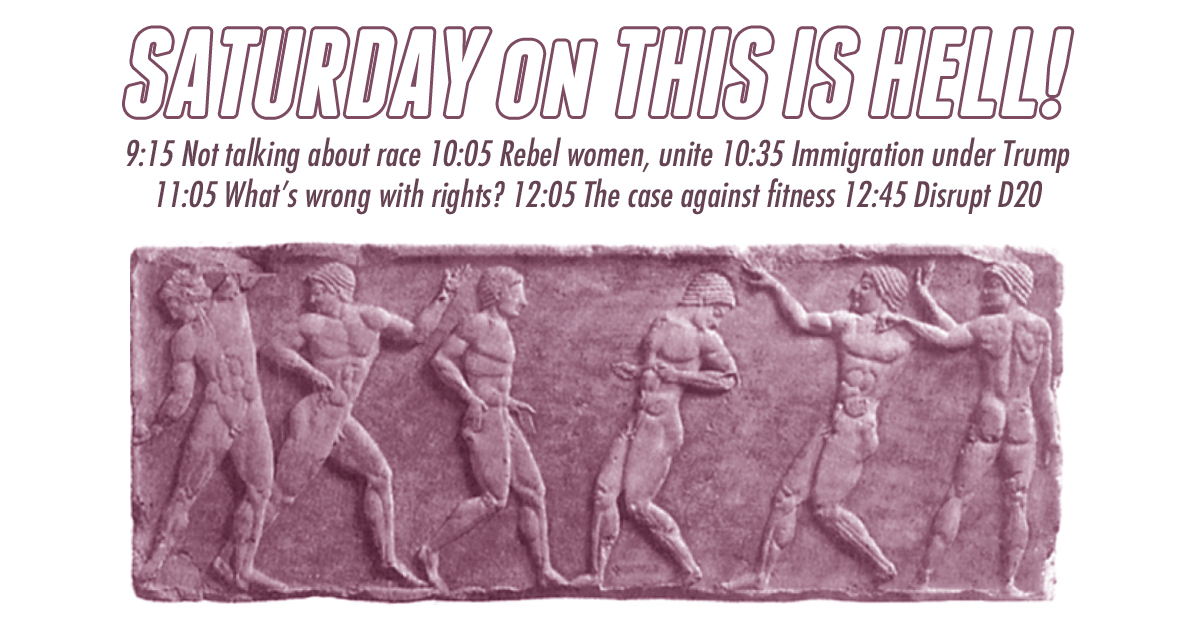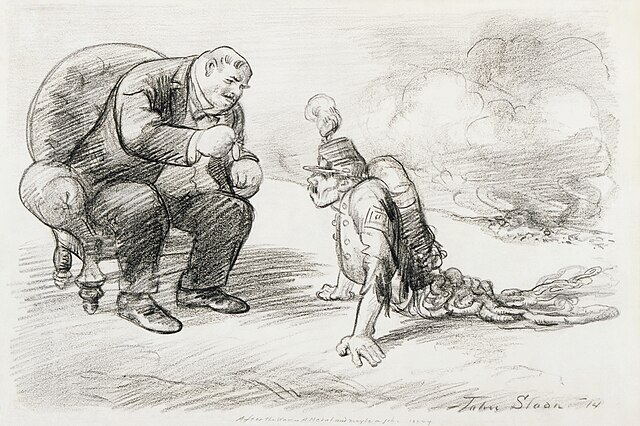
Historian Alfred McCoy joins us to discuss his new book, Cold War on Five Continents: A Global History of Empire and Espionage from Haymarket Books. "The Moment of Truth" with Jeff Dorchen follows the interview.
Help keep This Is Hell! completely listener supported and access bonus episodes by subscribing to our Patreon.
Please rate and review This Is Hell! wherever you get your podcasts. It really helps the show ascend the algorithm to reach new listeners.
The Assassination That Paved the Way for Trump’s Venezuela Attack / Séamus Malekafzali
Welcome to the Moment of Truth, the thirst that is the drink.
Why do I think about the American war in Indochina so often? For one thing, I have a strong sense of the illustrative nature of that war. The wrong choices a colonial power makes when it chooses to kill on a mass scale in order to control the destiny of other peoples are exemplified in the policy reasoning leading to our involvement there. Also, the character of those we chose as enemies highlights the wrongness of our military and diplomatic decisions.
We could not have chosen worse when it came to the decision to first ignore, then oppose, and then demonize Ho Chi Minh and those who came to follow him. He came, hat in hand, with a letter to the President of the United States immediately after WWII, asking for freedom for his country from the colonial oppression of the French. The letter was ignored. It either got to President Truman, who was either advised or decided on his own recognizance to ignore it, or someone decided on their own to stop the buck before it got to the buckstopper in chief.
The letter reportedly appealed to the self-proclaimed ideals of the USA: freedom, independence from tyranny, and the sovereignty of a people within their own borders. In imploring the US to take a position based on those ideals, perhaps Ho was being too literal in interpreting the rhetoric of our founding documents, probably because they'd been parroted by so many subsequent US leaders, albeit generally for self-serving reasons. It was an easy mistake to make, especially after the US military emerged from WWII looking like the savior of the oppressed, at least in Europe and most of Asia.
So here's a guy, leader of his country's nationalist movement, coming to ask the US to help him secure independence from a colonial power. And we, I'm going to call the US government "we," for a variety of reasons which you're free to extrapolate yourselves, we make exactly the wrong decision. The British Empire is already losing body parts like a cartoon leper, and is making noises about cutting India loose. The idea of Pakistan is already in the works. Other nations have won their independence from their colonial overlords. The writing's on the wall for colonial powers: "Let my people go!"
Hey, it's Passover, incidentally. Speaking of let my people go. Who would've thought the topic of the US invasion of Indochina would dovetail so neatly with the current high holy day?
... read more

Listen live from 9AM - 1:00PM Central on WNUR 89.3FM / stream at www.thisishell.com / subscribe to the podcast
9:15 - Writer Liza Featherstone examines the role of focus groups, between capital and consumer.
Liza is author of Divining Desire: Focus Groups and the Culture of Consultation from OR Books.
10:00 - Organizer Janae Bonsu reports on the use and abuse of Chicago's massive Gang Database.
Janae is the lead author of the report Tracked & Targeted: Early Findings on Chicago’s Gang Database.
10:35 - Writer Pearl Ahrens traces the boundaries between the French state and the free zone of ZAD.
Pearl wrote the article A Free Zone Unlike Any Other for Salvage.
11:05 - Geographer Katharyne Mitchell explains how neoliberal schools manufacture compliant workers.
Katharyne is author of Making Workers: Radical Geographies of Education from Pluto Press.
12:05 - Correspondent Karina Moreno explores the intersection of immigration policy and professional baseball.
Karina co-wrote the article Baseball, Latino America's pastime, faces new challenges in age of Trump with Mike Elk for The Guardian.
12:45 - In a Moment of Truth, Jeff Dorchen asks why the US took the Vietnam War as a problem-solving model.
Welcome to the Moment of Truth: the thirst that is the drink.
Last week, a day after the Ides of March, 2018, at about 3 am Pacific Daylight Savings Time, the Dalai Lama tweeted the following pearl: "When each of us learns to appreciate the critical importance of ethics and makes inner values like compassion and patience an integral part of our basic outlook on life, the effects will be far-reaching."
Yeah, no duh, genius.
We need a Dalai Lama for this kind of insight? "If we all appreciate how ethics are important and become compassionate and patient, things will change a lot." Really? This is how you earn your bowl of rice? A man who can take apart and put together a watch can't come up with anything better than, "When we become better, nicer people, it will be broadly transformative?"
Digging into his wording a little, though, which is probably not the most sensible endeavor given his questionable mastery of the English language, I have to say, I have some concerns.
"When" we appreciate the importance of ethics? "When" we integrate compassion and patience into our outlook? Yeah, when is that supposed to happen? You have it marked on your calendar? Don't hold your breath.
You're the bodhisattva, but I'm not as certain that we're each of us going to learn and internalize these laudable things. I hope we do, but the prospect seems uncertain. However, if we do make such changes in ourselves, I am certain it would transform our world quite radically.
Because imagine if it didn't. Imagine if each human woke up one morning, suddenly holding ethics as of utmost importance, and looking on others with kindness and patience, but then nothing changed. That'd be depressing. All that turning into ethical and compassionate beings, for nothing. Uch. That would suck.
We do live in a troubled world. And the biggest, most far-reaching decisions today are surely being made by those who hold ethics as not particularly valuable or even relevant, and for whom compassion and patience are lacking in their basic outlook. Lacking in the extreme. I'd always assumed that a lot of the world's current problems issued from precisely this lack of ethical priorities and compassion, especially at the top, but also all the way down the social hierarchy. And, boy, if I could do such a thing, I sure would prescribe some extra ethics and compassion, in order to begin repairing the global human catastrophe.
But imagine if, say Donald Dump and the... read more

Listen live from 9AM - 1:00PM Central on WNUR 89.3FM / stream at www.thisishell.com / subscribe to the podcast
9:15 - Sociologist Nisha Kapoor explores the new mechanisms of security state extremism.
Nisha is author of the book Deport, Deprive, Extradite: 21st Century State Extremism from Verso.
10:00 - Journalist Jaimee A. Swift connects Marielle Franco's murder to a history of gendered, racialized state violence.
Jaimee wrote the article Marielle Franco, Black Queer Women, and Police Violence in Brazil for Black Perspectives.
10:35 - Journalist Kim Baca reports on a Native American campaign towards food sovereignty.
Kim wrote the article A Native Coalition is Fighting for a Better 2018 Farm Bill for In These Times.
11:05 - Historian Annelise Orleck explains how a low-wage labor movement went global.
Annelise is author of We Are All Fast-Food Workers Now: The Global Uprising Against Poverty Wages from Beacon Press.
12:05 - Policy researcher Stacy Mitchell examines the rise of Amazon's ascendant monopoly.
Stacy Mitchell wrote the article Amazon Doesn’t Just Want to Dominate the Market—It Wants to Become the Market for The Nation.
12:45 - In a Moment of Truth, Jeff Dorchen picks up after that lazy Dalai Lama.
Always batting cleanup on the show.
Welcome to the Moment of Truth: the thirst that is the drink.
After two miserable weeks in a row, I've decided to look on the bright side. I have two modes: the cosmically ecstatic, and the earthly miserable. But there are many sides to any story, I'm told, and what is the current state of affairs but a big fat story? A story with many sides. Like those icosahedrons you play Dungeon and Dragons with. Let's roughly estimate that 19 out of the twenty sides are dark sides. So there's one bright side.
It's unlikely the bright side is going to come up by itself. With a roll of the icosahedron, there's a 20% chance of it coming up, but do we have the time to wait or the wherewithal to gamble? And how will we know when we hit it? We'll have to pick up the D & D die and deliberately set it down with the bright side facing up. But first we have to figure out which side that is. We need to find the bright side.
We've nicely limited ourselves to twenty sides, which is already optimistic. But it's all theoretical, and therefore meaningless and without consequence, anyway.
I can define many of the dark sides. Here's one that has monopolized my attention: A tweet comedian Andy Kindler quoted from a-hole list actor James Woods about how corrupt a president Obama was. Kindler's comment: "What an evil sick racist failed human @RealJamesWoods is." I like Kindler. His pinned tweet is "Donald Trump is perfect if you like your Hitler stupid."
Woods's tweet blames Obama for the increase in school shootings, with an attached article from "The Blaze," which I guess is BuzzFeed for fascists, declaring "Obama school discipline guidelines allowed school shooter to buy gun despite troubling past." See, if you don't allow police to discipline children who misbehave in school, and get these kids into the criminal justice database as swiftly as possible, they won't have criminal records that would keep them from acquiring guns.
This logic is sound, but of course you could deny a child a weapon that fires multiple high-velocity rounds on the basis of non-criminal indications. Or for any number of very good reasons. I'm not in favor of criminalizing children any further than we already do, a tactic that always falls heavier on children of color, as all hard rain does. It seems to me these Blaze readers would rather contort their logic to place blame on Obama than figure out a solution, because they're racists who claim that Obama was the... read more

Listen live from 9AM - 1:00PM Central on WNUR 89.3FM / stream at www.thisishell.com / subscribe to the podcast
9:15 - Journalist Reni Eddo-Lodge explains why she is no longer talking to White people about race.
Reni is author of Why I’m No Longer Talking to White People About Race from Bloomsbury.
10:05 - CIP Americas Director Laura Carlsen reports on a radical women's gathering in Zapatista territory.
Last week Laura attended the “First International Gathering of Politics, Art, Sport, and Culture for Women in Struggle” in Southeast Mexico.
10:35 - Current Affairs editor Brianna Rennix explores immigration politics in the Trump era.
Brianna wrote the articles A Tale Of Two Atrocities: From Tululché to New Bedford and How Democrats Can Negotiate Effectively On Immigration for Current Affairs.
11:05 - Law scholar Radha D'Souza examines the limits of rights discourse under global capitalism.
Radha is author of What's Wrong with Rights? Social Movements, Law and Liberal Imaginations from Pluto Press.
12:05 - Writer Barbara Ehrenreich makes a case against the utopian culture of personal fitness.
Barbara wrote the article Body Work: The curiously self-punishing rites of fitness culture for The Baffler.
12:45 - In a Moment of Truth, Jeff Dorchen looks at the Dungeons & Dragons icosahedron for hope.
I'm guessing Jeff would play a Troll Bard. Is that a possibility within D&D's race/class system?



